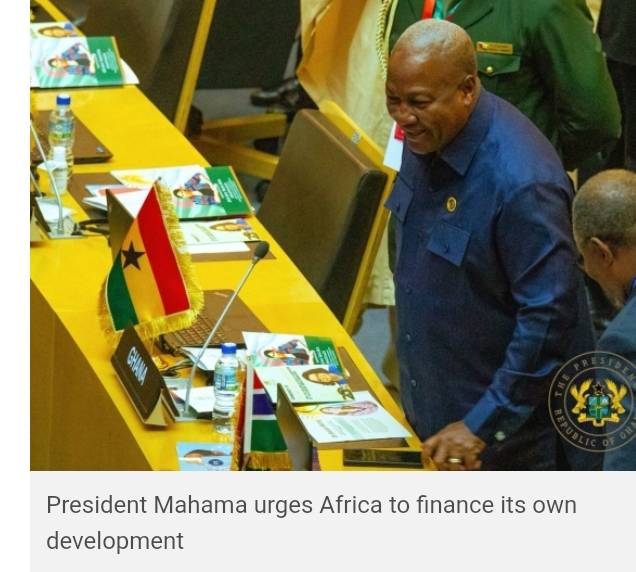President John Dramani Mahama has emphasised the need for African countries to mobilise domestic resources to reduce dependence on external financing and achieve sustainable growth.
He noted that Africa’s economic journey has demonstrated resilience despite numerous challenges, with projections indicating a recovery in growth to 3.7 per cent in 2024 and 4.03 per cent in 2025
This optimistic outlook highlights the inherent strength of our economies and the effectiveness of policy interventions,†President Mahama said.
President Mahama, who is the Champion on African Union Financial Institutions, delivered the keynote address at the Heads of State and Government breakfast dialogue held at the AU Commission headquarters in Addis Ababa, Ethiopia, today (Sunday).
The event, a side meeting of the AU Summit, was themed “Africa at the Forefront: Mobilising African Investment and Financing for Implementing Agenda 2063.†Hosted by President Mahama, it was held under the auspices of the Alliance of African Multilateral Financing Institutions, also called the African Club.
Present at the meeting were high-level officials from various multilateral organisations within and outside the continent, including the Chairperson of the Governing Council of the Alliance of African Multilateral Financing Institutions (AAMFI) and President and Chairman of the Board of Directors of Afreximbank, Professor Benedict Oramah, as well as the Director General of the World Trade Organization (WTO), Dr Ngozi Okonjo-Iweala.
Also in attendance were the African Union High Representative for Financing of the Union and the Peace Fund, Dr Donald Kaberuka, and the Commissioner for Economic Development, Trade, Tourism, Industry, and Minerals at the AU, Ambassador Albert Muchanga, among others.
Despite the positive outlook, President Mahama cautioned that the continent still faces significant challenges.
“Notwithstanding these positive trends, we must confront the reality that our growth has not always translated into significant improvements in per capita income. Structural transformation remains uneven, with many economies still reliant on low-productivity sectors,†he said.
He highlighted Africa’s substantial financing gap, estimated at approximately $402 billion annually until 2030.
"This financing gap is not merely a statistic," he said. "It represents the unrealised potential of millions of Africans whose dream for a better life depends on our ability to invest wisely in infrastructure, education, technology, and health."
Beyond financial difficulties, he noted that the continent continues to grapple with climate change, geopolitical tensions, widening gaps in multilateralism, and the persistent threat of diseases and pandemics, which could disrupt Africa’s progress towards sustainable development.
“We envision that strategic investments in health, education, energy, technology, and infrastructure are crucial. It is noteworthy, however, that the financing gap for these investments is substantial,†he said.
To address this challenge, President Mahama advocated a multifaceted approach, including domestic resource mobilisation, improving tax administration, and combating illicit financial flows.
He also underscored the importance of African multilateral financial institutions in financing sustainable development. Strengthening these institutions, he said, would enable them to contribute effectively to the continent’s transformation and the realisation of Agenda 2063.
The establishment of the African Union financial institutions, including the African Central Bank, African Investment Bank, African Monetary Fund, and Pan-African Stock Exchange, is expected to foster investment and financing mechanisms to achieve Africa’s economic objectives.
President Mahama encouraged African countries to accelerate the implementation of these institutions and leverage their collective strengths to bridge the financing and investment gaps.
"It is our responsibility to strengthen our African multilateral financial institutions to effectively contribute to the transformation and realisation of our Agenda 2063," he said.
In her remarks, the Director General of the World Trade Organization, Dr Ngozi Okonjo-Iweala, urged African leaders to reduce their reliance on borrowing and instead explore innovative ways to attract and sustain investments on the continent.
“We must take advantage of investment that comes to Africa and be able to sustain them for our own development,†she said.
She suggested that Africa could raise funding by adding value to its natural resources, tapping into pension funds to generate patient capital for development, and exploring innovative ways to price carbon emissions.
A high-level panel discussion on the theme “Mobilising African Investment and Financing for Implementing Agenda 2063†further explored strategies for increasing African financial resources to meet the continent’s development priorities.




Alfred
Feb 17, 2025Good one